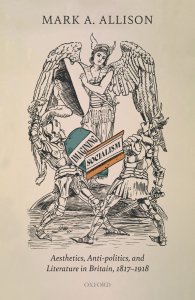‘Imagining Socialism’
Ohio Wesleyan English Professor’s First Book Explores Writings from the Beginnings of Socialism

DELAWARE, Ohio – The title of Ohio Wesleyan University professor Mark A. Allison’s new book – “Imagining Socialism: Aesthetics, Anti-politics, and Literature in Britain, 1817-1918” – immediately raises two questions: Why would a professor of English write a book about socialism? And what is “Anti-politics?”
“Those are good questions,” said Allison, Ph.D., OWU’s Ben T. Spencer Professor of English. “In Britain, writers and artists were very prominent supporters of socialism throughout the 19th century.
“For example, the Nobel prize-winning playwright George Bernard Shaw gave hundreds and hundreds of pro-socialist speeches, and H.G. Wells, who is remembered for science fiction classics like ‘The War of the Worlds’ and ‘The Invisible Man,’ wrote works of socialist propaganda that sold as well as his novels,” Allison said.
“The more I researched this connection, the more it made sense. Unlike other forms of social organization, like, say, monarchy or democracy, there has never been a fully realized socialist society. Imagination, that key trait of artists, was required to envision what it might be like. Thus my title, ‘Imagining Socialism.’”
And “Anti-politics?”
“Most people think socialism means big government and state control,” said Allison, who joined the Ohio Wesleyan faculty in 2007. “But all of the founders of socialism had a low opinion of politics, which they associated with partisanship, corruption, and unnecessary wars. This was especially true in Britain, which, like America, has a long history of distrusting centralized authority.
“Socialists were primarily interested in what they called ‘social’ rather than ‘political’ reform,” he continued. “They believed that, if you wanted to make society more just, you had to concentrate on sites like the workplace, the school, and the local community. By transforming the building blocks of civil society, you could foster cooperation instead of competition, leading to social harmony. In time, these reforms would diminish the scope of institutional politics, or even replace it altogether.
“As I was investigating socialism’s “anti-political” approach to reform, I discovered that there was a second reason that writers and artists were so central to British socialism,” continued Allison, who also serves as co-director of Ohio Wesleyan’s Honors Program. “The arts themselves possess resources that might help to de-politicize collective life.
“For example,” he said, “William Morris, the great poet and artistic polymath, argued that, if men and women were allowed to approach all labor with the same pride and creativity that skilled craftspeople bring to their work, it would eventually enable citizens to relate to one another with a mutual respect that would eliminate the need for formal politics.
“Robert Owen, a cotton mill manager and the founder of British socialism, believed that the way to achieve a non-governmental form of society was to educate young people so that they sought their own happiness through the good of the collective,” Allison continued. “Owen called this ‘rational education.’ But when you look at the curriculum at his school, you find instruction in singing and dancing was at the heart of it. These activities quite literally taught children to ‘harmonize’ with one another: to channel their natural desire to excel into a form of striving that would improve the performance of the group.
“While socialists across the 19th century approached societal problems from different angles, they repeatedly turned to the arts in their efforts to tame ‘politics’ and to imagine the world otherwise.”

Although Allison’s book discusses the 19th-century British tradition of socialism, it engages with concerns that are of the moment: growing economic inequality, exasperation at political polarization and gridlock, and the surprising resurgence of interest in socialism among Millennials and Generation Z.
“When I began researching this book, socialism was not on the contemporary radar,” Allison said. “Then the 2007-2008 Great Recession happened, and things began to snowball.
“Bernie Sanders conducted two unexpectedly popular presidential campaigns, and Jeremy Corbyn had his five-year term as Prime Minister of the UK. Newspapers began running opinion polls that show young people have more favorable opinions of socialism than capitalism. Suddenly what I thought of as a very niche subject did not seem so niche at all.”
What does Allison want readers to take from his book?
“First of all, I believe in the intrinsic value of literature and literary analysis,” he said. “The backbone of this book is the careful examination of works by great 19th-century writers, some famous, some unjustly forgotten.
“Beyond that, I will quote the final words of my introduction: ‘It would be folly to believe that a literary study of nineteenth-century British socialism can unlock the door to utopia. But it would be vanity to think that the struggles of so many intelligent, committed, and well-meaning men and women have nothing to teach us today.’”
Learn more about “Imagining Socialism” and more about Allison and Ohio Wesleyan’s Department of English at owu.edu/English.
Founded in 1842, Ohio Wesleyan University is one of the nation’s premier liberal arts universities. Located in Delaware, Ohio, the private university offers more than 70 undergraduate majors and competes in 24 NCAA Division III varsity sports. Through its signature program, The OWU Connection, Ohio Wesleyan teaches students to integrate knowledge across disciplines, build a diverse and global perspective, and apply knowledge in real-world settings. Ohio Wesleyan is featured in the book “Colleges That Change Lives” and included on the U.S. News & World Report and Princeton Review “Best Colleges” lists. Learn more at owu.edu.
